BULAW 1502 Fundamentals of Law: Rollinstone Ltd Case Study Analysis
VerifiedAdded on 2023/06/04
|6
|1250
|340
Case Study
AI Summary
This assignment provides a detailed analysis of the Rollinstone Ltd case study within the context of Australian Consumer Law, specifically focusing on potential breaches of consumer protection regulations. It examines Rollinstone's conduct in relation to misleading or deceptive practices, false representations, and failures in service delivery. The analysis draws parallels with the ACCC v TPG Internet Pty Ltd case to illustrate the application of consumer law principles. The assignment concludes that Rollinstone is liable for its actions, particularly concerning misrepresentation of Bob's qualifications and failure to disclose changes in company operations, which ultimately led to Jimi Hendricks relying on outdated information and suffering potential losses. Desklib offers similar solved assignments and past papers for students.
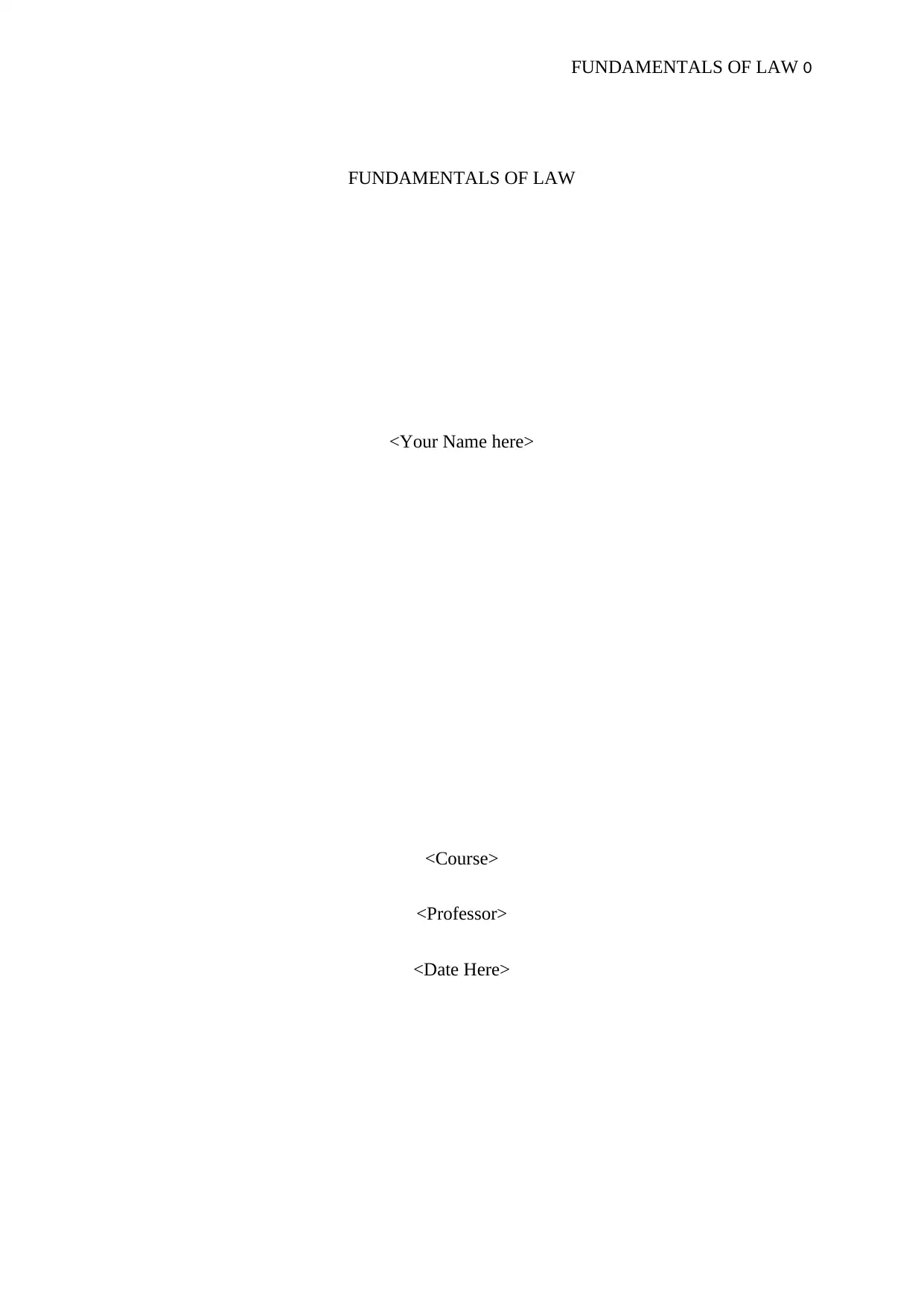
FUNDAMENTALS OF LAW 0
FUNDAMENTALS OF LAW
<Your Name here>
<Course>
<Professor>
<Date Here>
FUNDAMENTALS OF LAW
<Your Name here>
<Course>
<Professor>
<Date Here>
Paraphrase This Document
Need a fresh take? Get an instant paraphrase of this document with our AI Paraphraser
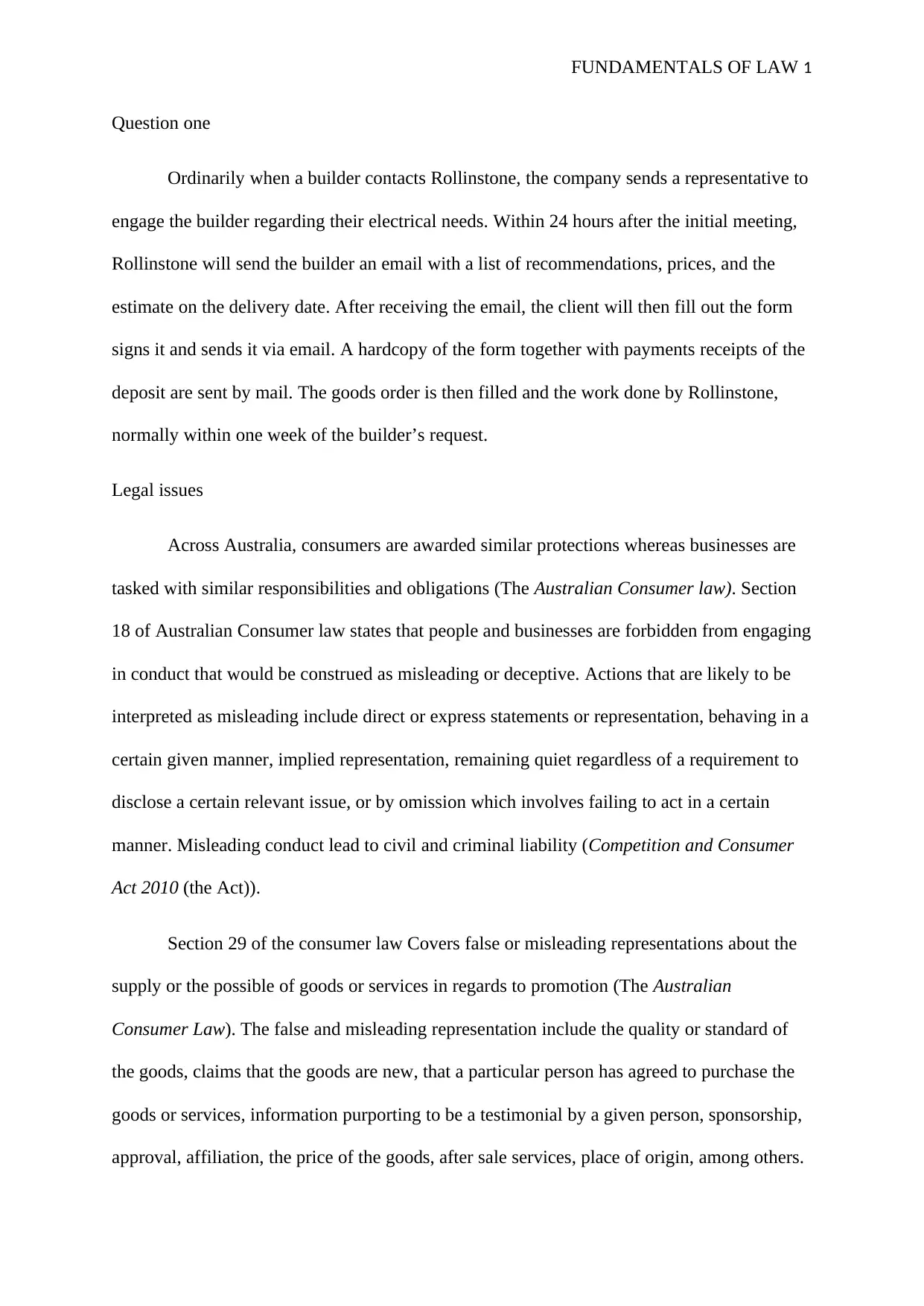
FUNDAMENTALS OF LAW 1
Question one
Ordinarily when a builder contacts Rollinstone, the company sends a representative to
engage the builder regarding their electrical needs. Within 24 hours after the initial meeting,
Rollinstone will send the builder an email with a list of recommendations, prices, and the
estimate on the delivery date. After receiving the email, the client will then fill out the form
signs it and sends it via email. A hardcopy of the form together with payments receipts of the
deposit are sent by mail. The goods order is then filled and the work done by Rollinstone,
normally within one week of the builder’s request.
Legal issues
Across Australia, consumers are awarded similar protections whereas businesses are
tasked with similar responsibilities and obligations (The Australian Consumer law). Section
18 of Australian Consumer law states that people and businesses are forbidden from engaging
in conduct that would be construed as misleading or deceptive. Actions that are likely to be
interpreted as misleading include direct or express statements or representation, behaving in a
certain given manner, implied representation, remaining quiet regardless of a requirement to
disclose a certain relevant issue, or by omission which involves failing to act in a certain
manner. Misleading conduct lead to civil and criminal liability (Competition and Consumer
Act 2010 (the Act)).
Section 29 of the consumer law Covers false or misleading representations about the
supply or the possible of goods or services in regards to promotion (The Australian
Consumer Law). The false and misleading representation include the quality or standard of
the goods, claims that the goods are new, that a particular person has agreed to purchase the
goods or services, information purporting to be a testimonial by a given person, sponsorship,
approval, affiliation, the price of the goods, after sale services, place of origin, among others.
Question one
Ordinarily when a builder contacts Rollinstone, the company sends a representative to
engage the builder regarding their electrical needs. Within 24 hours after the initial meeting,
Rollinstone will send the builder an email with a list of recommendations, prices, and the
estimate on the delivery date. After receiving the email, the client will then fill out the form
signs it and sends it via email. A hardcopy of the form together with payments receipts of the
deposit are sent by mail. The goods order is then filled and the work done by Rollinstone,
normally within one week of the builder’s request.
Legal issues
Across Australia, consumers are awarded similar protections whereas businesses are
tasked with similar responsibilities and obligations (The Australian Consumer law). Section
18 of Australian Consumer law states that people and businesses are forbidden from engaging
in conduct that would be construed as misleading or deceptive. Actions that are likely to be
interpreted as misleading include direct or express statements or representation, behaving in a
certain given manner, implied representation, remaining quiet regardless of a requirement to
disclose a certain relevant issue, or by omission which involves failing to act in a certain
manner. Misleading conduct lead to civil and criminal liability (Competition and Consumer
Act 2010 (the Act)).
Section 29 of the consumer law Covers false or misleading representations about the
supply or the possible of goods or services in regards to promotion (The Australian
Consumer Law). The false and misleading representation include the quality or standard of
the goods, claims that the goods are new, that a particular person has agreed to purchase the
goods or services, information purporting to be a testimonial by a given person, sponsorship,
approval, affiliation, the price of the goods, after sale services, place of origin, among others.
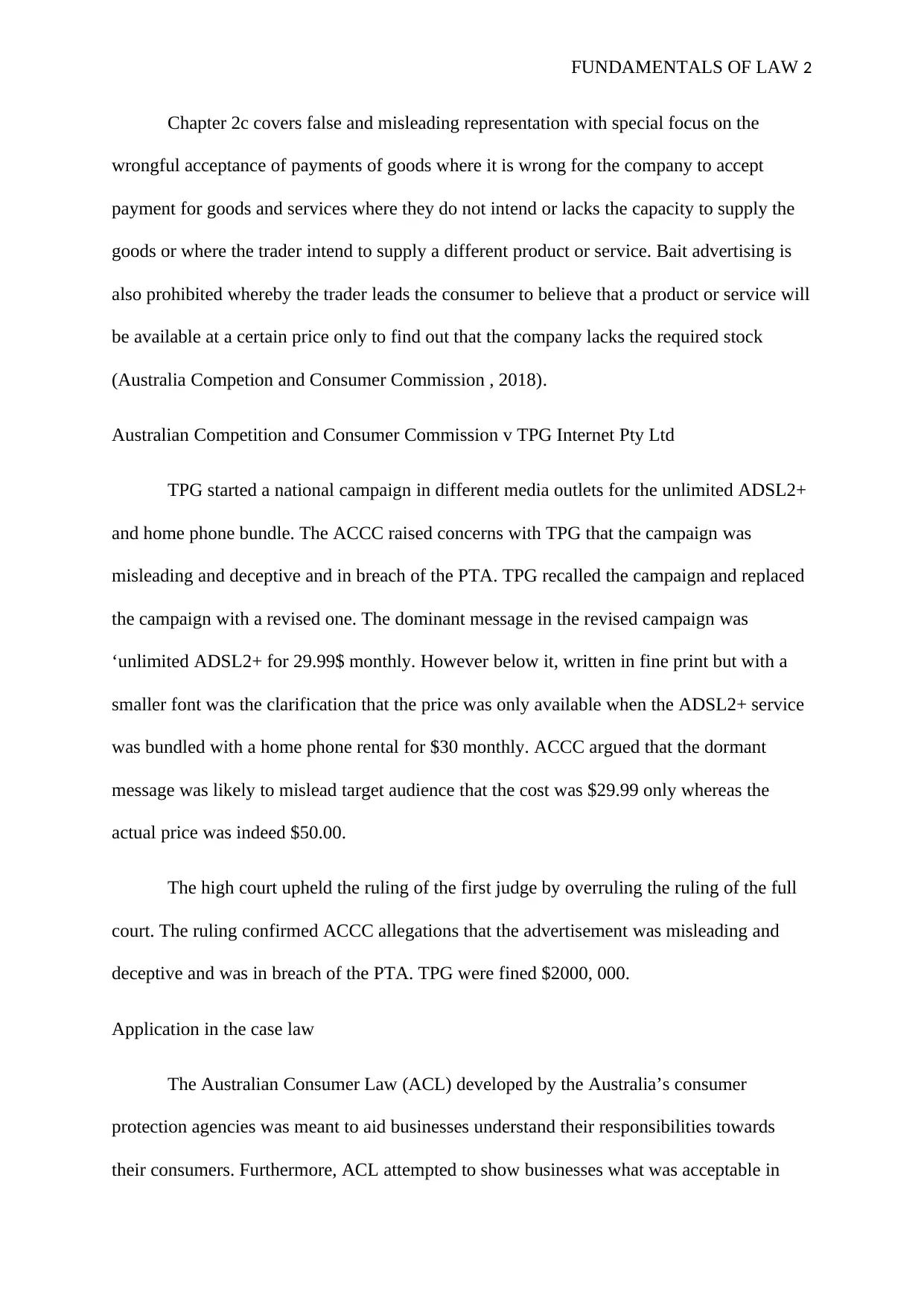
FUNDAMENTALS OF LAW 2
Chapter 2c covers false and misleading representation with special focus on the
wrongful acceptance of payments of goods where it is wrong for the company to accept
payment for goods and services where they do not intend or lacks the capacity to supply the
goods or where the trader intend to supply a different product or service. Bait advertising is
also prohibited whereby the trader leads the consumer to believe that a product or service will
be available at a certain price only to find out that the company lacks the required stock
(Australia Competion and Consumer Commission , 2018).
Australian Competition and Consumer Commission v TPG Internet Pty Ltd
TPG started a national campaign in different media outlets for the unlimited ADSL2+
and home phone bundle. The ACCC raised concerns with TPG that the campaign was
misleading and deceptive and in breach of the PTA. TPG recalled the campaign and replaced
the campaign with a revised one. The dominant message in the revised campaign was
‘unlimited ADSL2+ for 29.99$ monthly. However below it, written in fine print but with a
smaller font was the clarification that the price was only available when the ADSL2+ service
was bundled with a home phone rental for $30 monthly. ACCC argued that the dormant
message was likely to mislead target audience that the cost was $29.99 only whereas the
actual price was indeed $50.00.
The high court upheld the ruling of the first judge by overruling the ruling of the full
court. The ruling confirmed ACCC allegations that the advertisement was misleading and
deceptive and was in breach of the PTA. TPG were fined $2000, 000.
Application in the case law
The Australian Consumer Law (ACL) developed by the Australia’s consumer
protection agencies was meant to aid businesses understand their responsibilities towards
their consumers. Furthermore, ACL attempted to show businesses what was acceptable in
Chapter 2c covers false and misleading representation with special focus on the
wrongful acceptance of payments of goods where it is wrong for the company to accept
payment for goods and services where they do not intend or lacks the capacity to supply the
goods or where the trader intend to supply a different product or service. Bait advertising is
also prohibited whereby the trader leads the consumer to believe that a product or service will
be available at a certain price only to find out that the company lacks the required stock
(Australia Competion and Consumer Commission , 2018).
Australian Competition and Consumer Commission v TPG Internet Pty Ltd
TPG started a national campaign in different media outlets for the unlimited ADSL2+
and home phone bundle. The ACCC raised concerns with TPG that the campaign was
misleading and deceptive and in breach of the PTA. TPG recalled the campaign and replaced
the campaign with a revised one. The dominant message in the revised campaign was
‘unlimited ADSL2+ for 29.99$ monthly. However below it, written in fine print but with a
smaller font was the clarification that the price was only available when the ADSL2+ service
was bundled with a home phone rental for $30 monthly. ACCC argued that the dormant
message was likely to mislead target audience that the cost was $29.99 only whereas the
actual price was indeed $50.00.
The high court upheld the ruling of the first judge by overruling the ruling of the full
court. The ruling confirmed ACCC allegations that the advertisement was misleading and
deceptive and was in breach of the PTA. TPG were fined $2000, 000.
Application in the case law
The Australian Consumer Law (ACL) developed by the Australia’s consumer
protection agencies was meant to aid businesses understand their responsibilities towards
their consumers. Furthermore, ACL attempted to show businesses what was acceptable in
⊘ This is a preview!⊘
Do you want full access?
Subscribe today to unlock all pages.

Trusted by 1+ million students worldwide
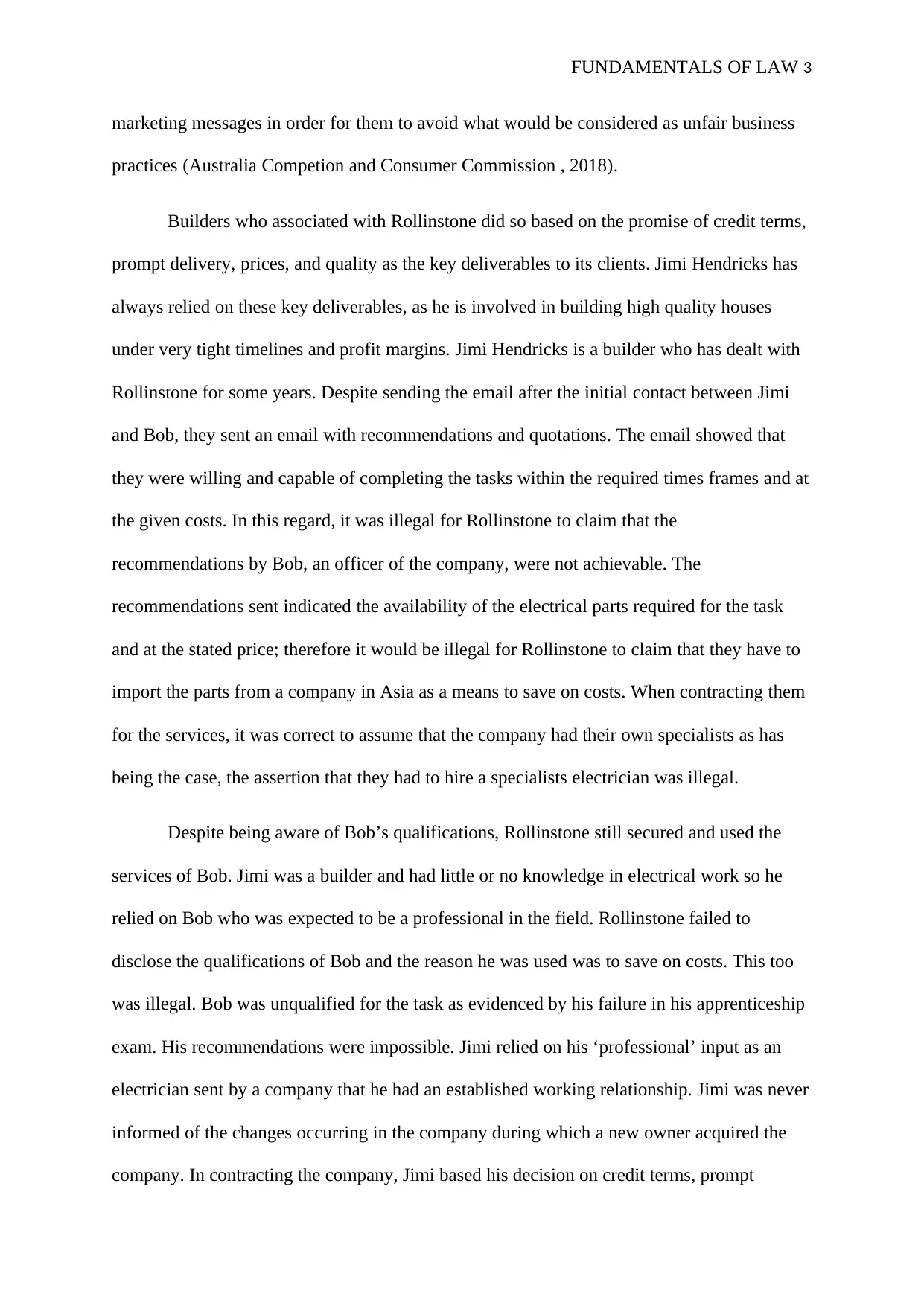
FUNDAMENTALS OF LAW 3
marketing messages in order for them to avoid what would be considered as unfair business
practices (Australia Competion and Consumer Commission , 2018).
Builders who associated with Rollinstone did so based on the promise of credit terms,
prompt delivery, prices, and quality as the key deliverables to its clients. Jimi Hendricks has
always relied on these key deliverables, as he is involved in building high quality houses
under very tight timelines and profit margins. Jimi Hendricks is a builder who has dealt with
Rollinstone for some years. Despite sending the email after the initial contact between Jimi
and Bob, they sent an email with recommendations and quotations. The email showed that
they were willing and capable of completing the tasks within the required times frames and at
the given costs. In this regard, it was illegal for Rollinstone to claim that the
recommendations by Bob, an officer of the company, were not achievable. The
recommendations sent indicated the availability of the electrical parts required for the task
and at the stated price; therefore it would be illegal for Rollinstone to claim that they have to
import the parts from a company in Asia as a means to save on costs. When contracting them
for the services, it was correct to assume that the company had their own specialists as has
being the case, the assertion that they had to hire a specialists electrician was illegal.
Despite being aware of Bob’s qualifications, Rollinstone still secured and used the
services of Bob. Jimi was a builder and had little or no knowledge in electrical work so he
relied on Bob who was expected to be a professional in the field. Rollinstone failed to
disclose the qualifications of Bob and the reason he was used was to save on costs. This too
was illegal. Bob was unqualified for the task as evidenced by his failure in his apprenticeship
exam. His recommendations were impossible. Jimi relied on his ‘professional’ input as an
electrician sent by a company that he had an established working relationship. Jimi was never
informed of the changes occurring in the company during which a new owner acquired the
company. In contracting the company, Jimi based his decision on credit terms, prompt
marketing messages in order for them to avoid what would be considered as unfair business
practices (Australia Competion and Consumer Commission , 2018).
Builders who associated with Rollinstone did so based on the promise of credit terms,
prompt delivery, prices, and quality as the key deliverables to its clients. Jimi Hendricks has
always relied on these key deliverables, as he is involved in building high quality houses
under very tight timelines and profit margins. Jimi Hendricks is a builder who has dealt with
Rollinstone for some years. Despite sending the email after the initial contact between Jimi
and Bob, they sent an email with recommendations and quotations. The email showed that
they were willing and capable of completing the tasks within the required times frames and at
the given costs. In this regard, it was illegal for Rollinstone to claim that the
recommendations by Bob, an officer of the company, were not achievable. The
recommendations sent indicated the availability of the electrical parts required for the task
and at the stated price; therefore it would be illegal for Rollinstone to claim that they have to
import the parts from a company in Asia as a means to save on costs. When contracting them
for the services, it was correct to assume that the company had their own specialists as has
being the case, the assertion that they had to hire a specialists electrician was illegal.
Despite being aware of Bob’s qualifications, Rollinstone still secured and used the
services of Bob. Jimi was a builder and had little or no knowledge in electrical work so he
relied on Bob who was expected to be a professional in the field. Rollinstone failed to
disclose the qualifications of Bob and the reason he was used was to save on costs. This too
was illegal. Bob was unqualified for the task as evidenced by his failure in his apprenticeship
exam. His recommendations were impossible. Jimi relied on his ‘professional’ input as an
electrician sent by a company that he had an established working relationship. Jimi was never
informed of the changes occurring in the company during which a new owner acquired the
company. In contracting the company, Jimi based his decision on credit terms, prompt
Paraphrase This Document
Need a fresh take? Get an instant paraphrase of this document with our AI Paraphraser
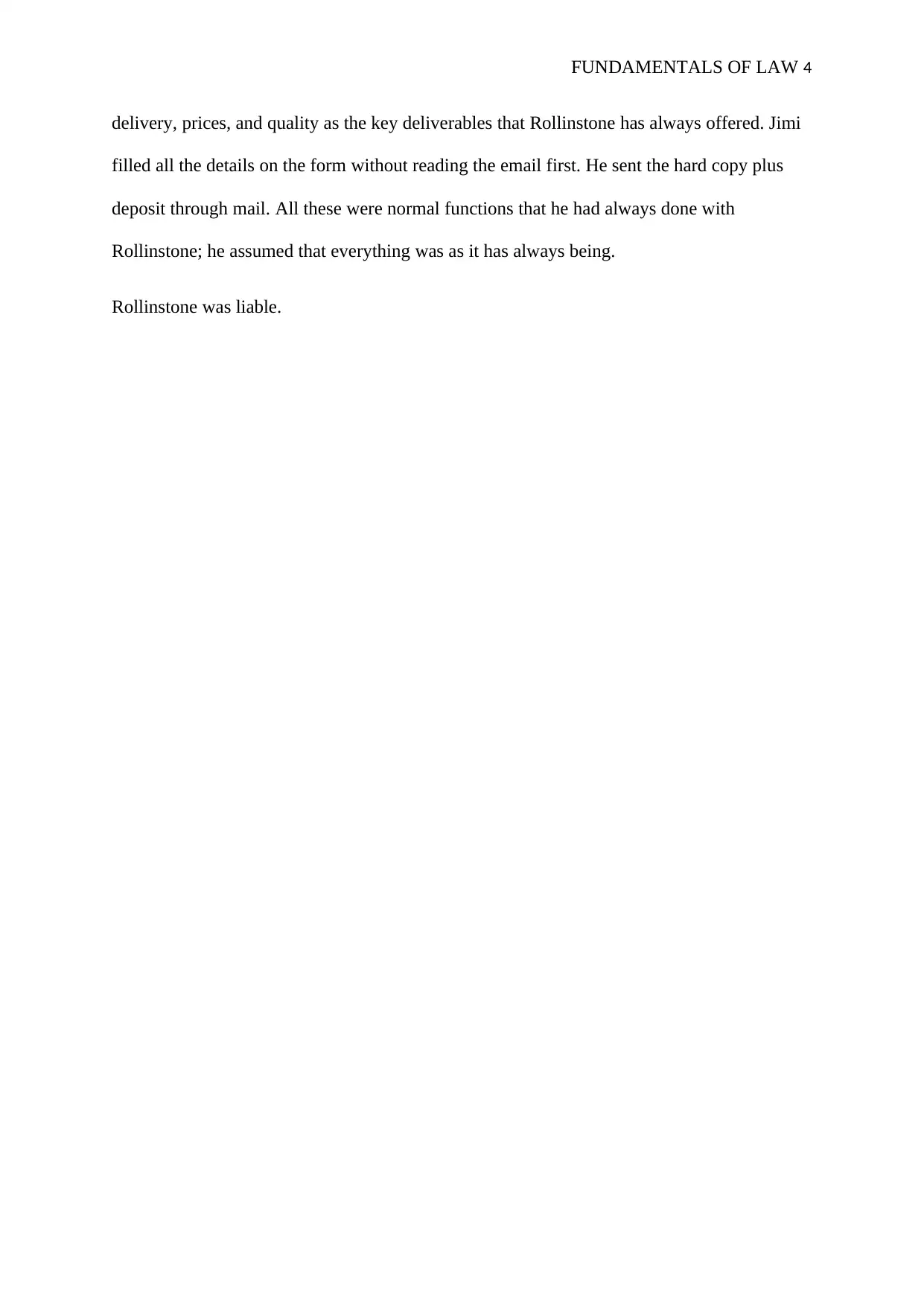
FUNDAMENTALS OF LAW 4
delivery, prices, and quality as the key deliverables that Rollinstone has always offered. Jimi
filled all the details on the form without reading the email first. He sent the hard copy plus
deposit through mail. All these were normal functions that he had always done with
Rollinstone; he assumed that everything was as it has always being.
Rollinstone was liable.
delivery, prices, and quality as the key deliverables that Rollinstone has always offered. Jimi
filled all the details on the form without reading the email first. He sent the hard copy plus
deposit through mail. All these were normal functions that he had always done with
Rollinstone; he assumed that everything was as it has always being.
Rollinstone was liable.
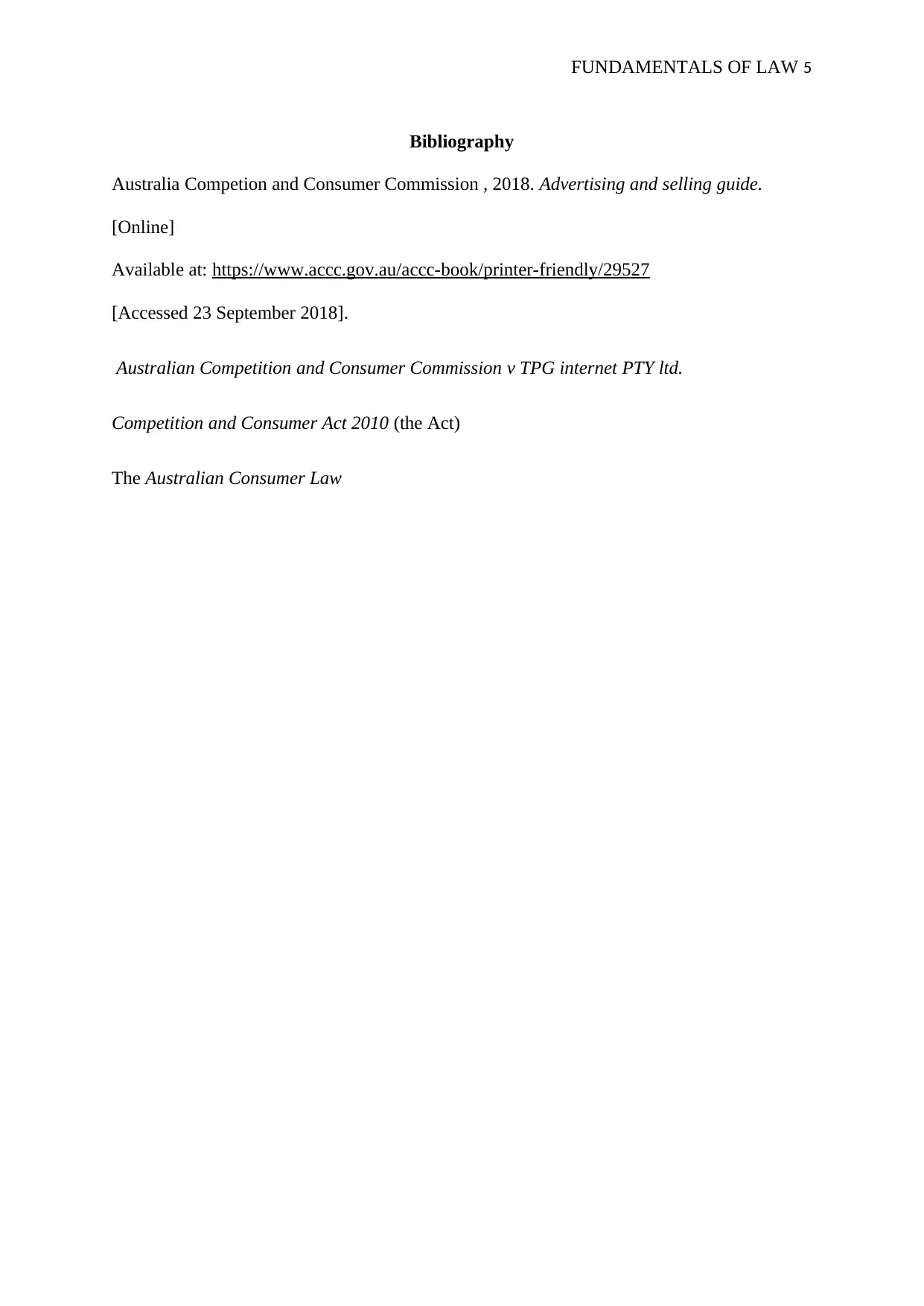
FUNDAMENTALS OF LAW 5
Bibliography
Australia Competion and Consumer Commission , 2018. Advertising and selling guide.
[Online]
Available at: https://www.accc.gov.au/accc-book/printer-friendly/29527
[Accessed 23 September 2018].
Australian Competition and Consumer Commission v TPG internet PTY ltd.
Competition and Consumer Act 2010 (the Act)
The Australian Consumer Law
Bibliography
Australia Competion and Consumer Commission , 2018. Advertising and selling guide.
[Online]
Available at: https://www.accc.gov.au/accc-book/printer-friendly/29527
[Accessed 23 September 2018].
Australian Competition and Consumer Commission v TPG internet PTY ltd.
Competition and Consumer Act 2010 (the Act)
The Australian Consumer Law
⊘ This is a preview!⊘
Do you want full access?
Subscribe today to unlock all pages.

Trusted by 1+ million students worldwide
1 out of 6
Related Documents
Your All-in-One AI-Powered Toolkit for Academic Success.
+13062052269
info@desklib.com
Available 24*7 on WhatsApp / Email
![[object Object]](/_next/static/media/star-bottom.7253800d.svg)
Unlock your academic potential
Copyright © 2020–2026 A2Z Services. All Rights Reserved. Developed and managed by ZUCOL.




